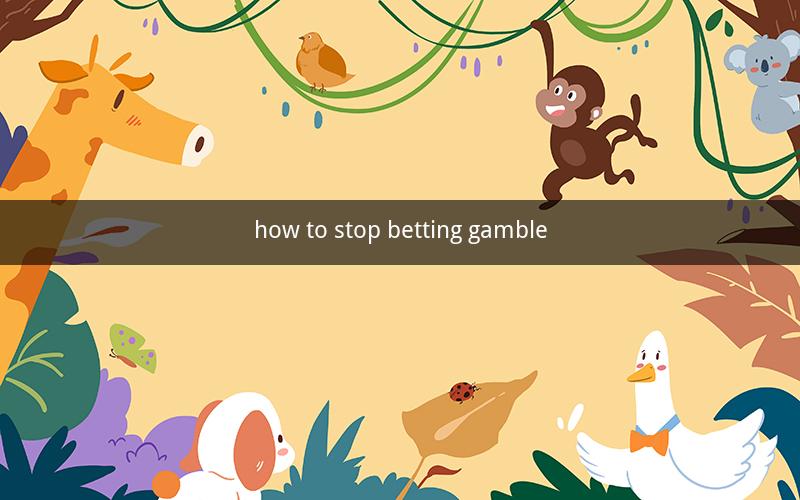
Table of Contents
1. Introduction to Problem Gambling
2. Understanding the Causes of Gambling Addiction
3. Recognizing the Signs of a Gambling Problem
4. Steps to Take to Stop Betting and Gamble
4.1 Seek Professional Help
4.2 Create a Budget and Stick to It
4.3 Remove Temptations from Your Environment
4.4 Find Healthy Alternatives to Gambling
4.5 Strengthen Support Systems
5. The Importance of Self-Reflection and Acceptance
6. The Role of Technology in Preventing Gambling
7. Conclusion
---
1. Introduction to Problem Gambling
Problem gambling, also known as gambling addiction, is a behavioral disorder characterized by the inability to control or stop gambling despite harmful consequences. It affects individuals from all walks of life and can lead to severe financial, social, and emotional problems. Understanding the nature of this addiction is the first step in overcoming it.
2. Understanding the Causes of Gambling Addiction
Several factors contribute to the development of gambling addiction. These include genetic predisposition, environmental influences, and psychological factors such as impulsivity, thrill-seeking, and a desire to escape from reality. Recognizing these triggers is crucial in developing an effective strategy to stop gambling.
3. Recognizing the Signs of a Gambling Problem
Identifying the signs of a gambling problem is essential for taking the first step towards recovery. These signs include:
- Preoccupation with gambling, which interferes with daily activities
- Increased time spent gambling or planning to gamble
- Lying about gambling activities
- Using gambling as a way to cope with stress or negative emotions
- Borrowing money to fund gambling activities
- Risking personal relationships, employment, or health for gambling
4. Steps to Take to Stop Betting and Gamble
4.1 Seek Professional Help
Consulting with a mental health professional can provide you with the necessary tools and support to overcome your gambling addiction. Therapies such as cognitive-behavioral therapy (CBT) have been shown to be effective in treating gambling addiction.
4.2 Create a Budget and Stick to It
Setting a strict budget and adhering to it can help prevent financial strain and reduce the temptation to gamble. It is essential to allocate funds for essential expenses and avoid spending on non-essential items.
4.3 Remove Temptations from Your Environment
Eliminate any sources of temptation, such as visiting casinos or downloading gambling apps on your phone. Remove credit cards and other payment methods associated with gambling, and consider placing restrictions on your bank accounts.
4.4 Find Healthy Alternatives to Gambling
Engaging in healthy activities can help alleviate the urge to gamble. Consider hobbies, exercise, and spending time with friends and family. These activities can provide a sense of fulfillment and reduce stress.
4.5 Strengthen Support Systems
Build a support network of friends, family, and colleagues who understand and support your journey towards recovery. Attend support groups such as Gamblers Anonymous, which can provide guidance and camaraderie.
---
6. The Importance of Self-Reflection and Acceptance
Self-reflection is crucial in understanding the root causes of your gambling addiction. Accepting that you have a problem and being willing to seek help are the first steps towards overcoming it.
7. Conclusion
Stopping a gambling addiction is a challenging process that requires commitment, discipline, and support. By understanding the causes and signs of addiction, taking proactive steps to stop gambling, and seeking professional help, you can overcome this issue and reclaim your life.
---
Questions and Answers
1. What is the difference between recreational gambling and problem gambling?
- Recreational gambling is done for enjoyment and without any negative consequences, while problem gambling involves harmful consequences such as financial strain, relationship issues, and emotional distress.
2. Can anyone become a problem gambler?
- Yes, anyone can develop a gambling addiction, regardless of age, gender, or socioeconomic status.
3. How can I tell if I am gambling too much?
- If gambling is causing problems in your life, such as financial strain, relationship issues, or health problems, it is a sign that you may be gambling too much.
4. What are some common treatments for gambling addiction?
- Common treatments for gambling addiction include cognitive-behavioral therapy (CBT), support groups, and medication for co-occurring mental health issues.
5. Can medication help with gambling addiction?
- While medication is not a cure for gambling addiction, it can help manage symptoms of co-occurring mental health issues that may contribute to the addiction.
6. Is it possible to recover from gambling addiction?
- Yes, it is possible to recover from gambling addiction with the right support, treatment, and commitment.
7. How can I support a loved one struggling with gambling addiction?
- You can support a loved one by providing a listening ear, offering empathy, and encouraging them to seek professional help.
8. What is the role of social media in gambling addiction?
- Social media can increase exposure to gambling advertisements and trigger the urge to gamble, potentially exacerbating addiction.
9. Can gambling addiction be cured?
- While gambling addiction is a chronic condition, it can be managed and controlled through effective treatment and lifestyle changes.
10. How can I prevent a relapse after overcoming a gambling addiction?
- To prevent a relapse, continue to seek support, maintain a healthy lifestyle, and be aware of potential triggers that may lead to gambling behavior.